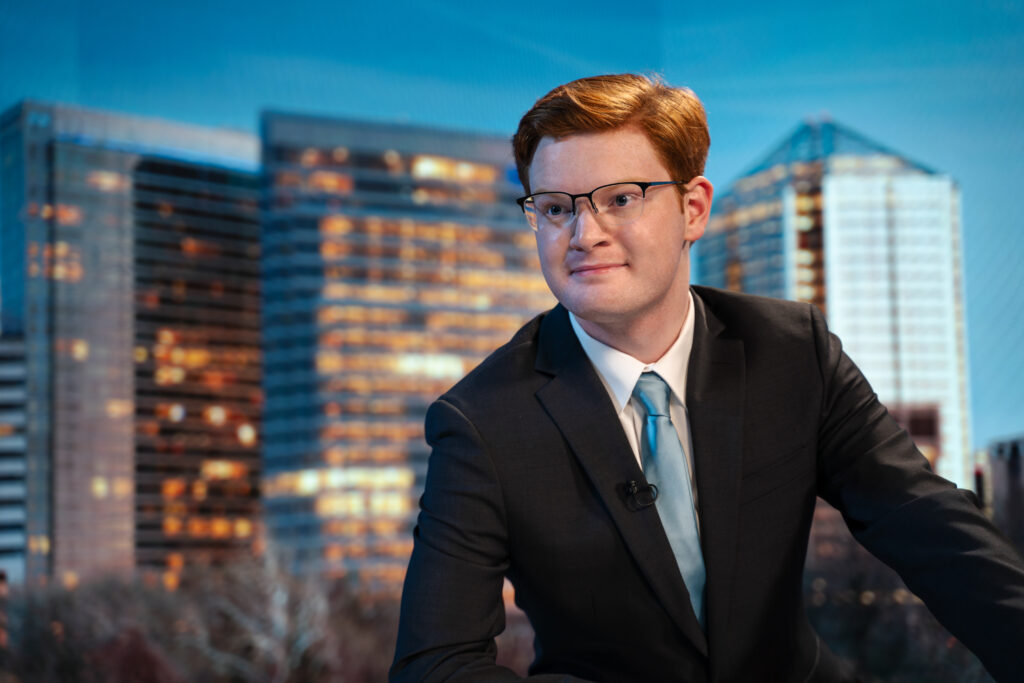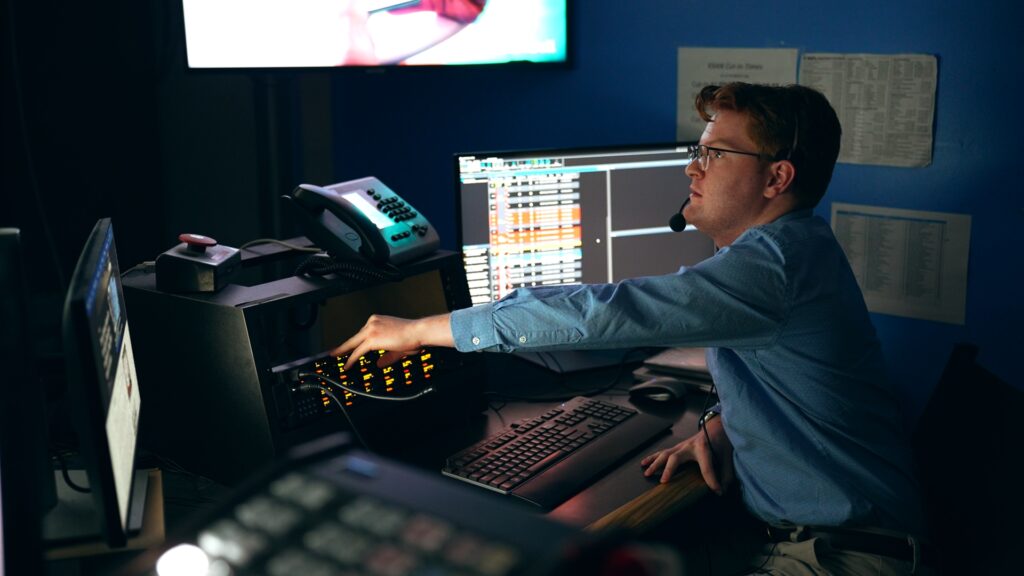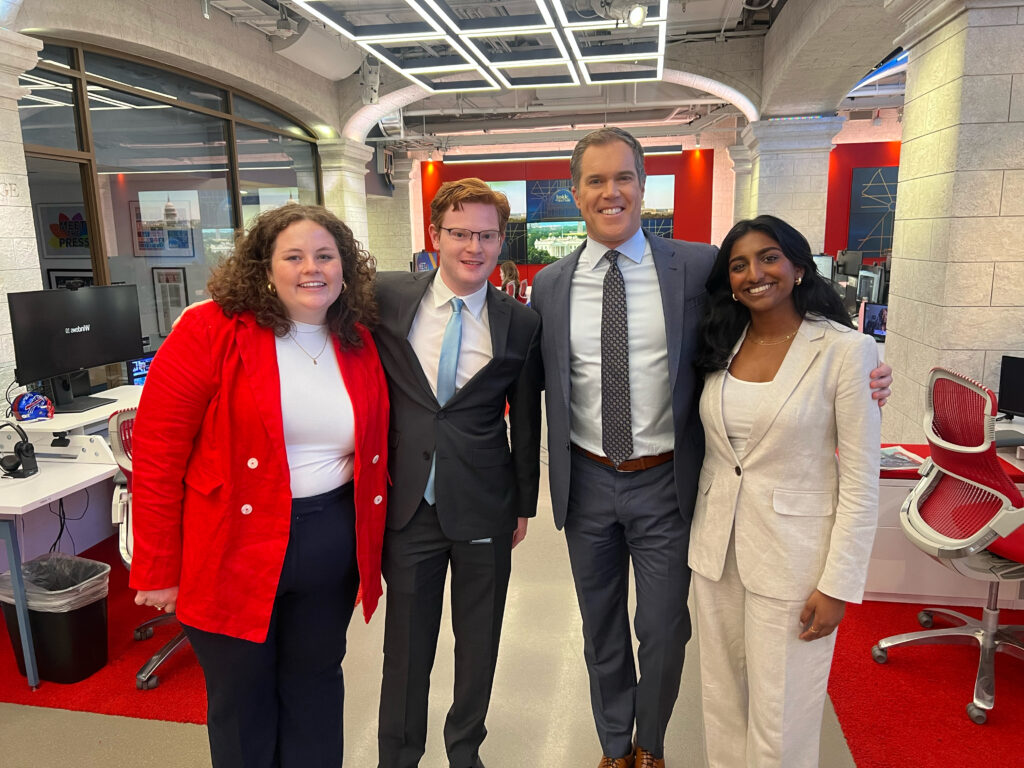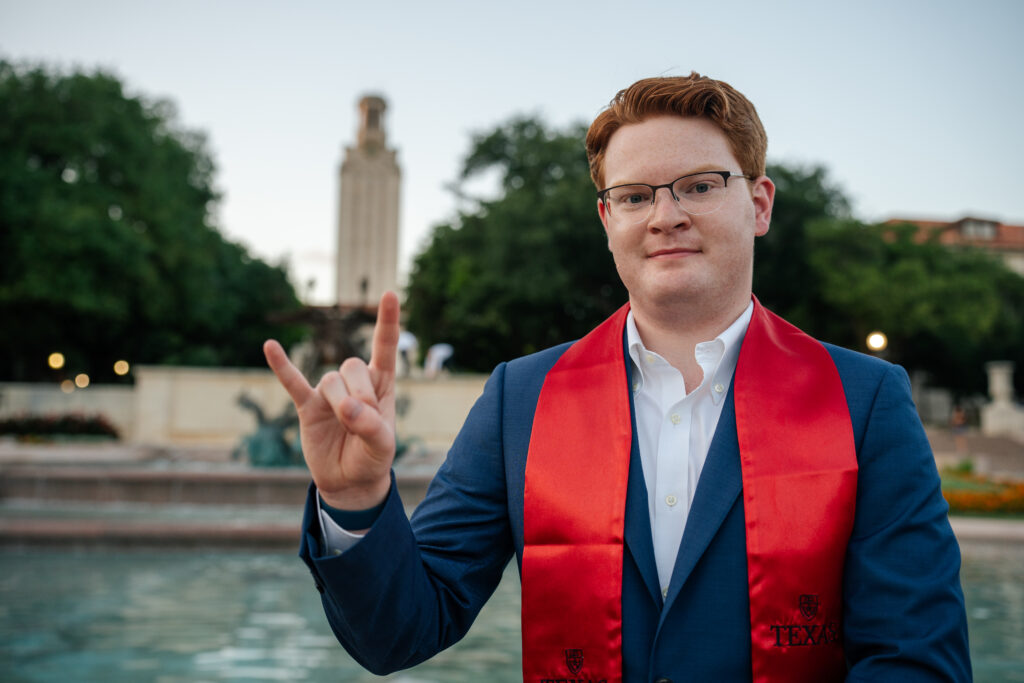Alumni Q&A with Kevin Myers: What the new grad sees for the road ahead, in journalism and in his own career
July 29, 2025
By: Anthony Payne
In this alumni Q&A, Kevin Myers, a recent graduate from UT Austin’s journalism program, shares how he built career momentum, his advice for young journalists, and his thoughts on the current media landscape.
This Q&A has been lightly edited for clarity.
How did you first get involved with Student Reporting Labs?
 I was taking the broadcast journalism class at Dominion High School in Sterling, Virginia, taught by Mr. Schwarz. He saw the passion I already had for video and encouraged me to go down the journalism route, and sign up for the SRL Summer Academy. The 2020 Academy was supposed to be in-person for a week at the Walter Cronkite School of Journalism at Arizona State, but because of COVID they changed it to a 10-week long program that was completely virtual. I reported a couple COVID-related stories, first on how students my age were grappling with the dramatic shift into lockdown. The second story, published at the end of the academy, was on my cousin Callie, a nurse at a hospital in Reno, Nevada who treated COVID patients. It was a peek into her world, into what was going on there at the time and the strain it was putting on her and the hospital.
I was taking the broadcast journalism class at Dominion High School in Sterling, Virginia, taught by Mr. Schwarz. He saw the passion I already had for video and encouraged me to go down the journalism route, and sign up for the SRL Summer Academy. The 2020 Academy was supposed to be in-person for a week at the Walter Cronkite School of Journalism at Arizona State, but because of COVID they changed it to a 10-week long program that was completely virtual. I reported a couple COVID-related stories, first on how students my age were grappling with the dramatic shift into lockdown. The second story, published at the end of the academy, was on my cousin Callie, a nurse at a hospital in Reno, Nevada who treated COVID patients. It was a peek into her world, into what was going on there at the time and the strain it was putting on her and the hospital.
How did you get your first internships and experience?
My first internship was with Tri Vision Studios. They do a lot of different government and advertising work. They really helped me develop video editing skills. They’re not so much news oriented, but I got a lot of reps in with Adobe Premiere Pro that way.
My first big internship in the industry was with Meet the Press. It was hard to not walk in there and not be starstruck that we were sitting in meetings every morning with Kristen Welker, the moderator of Meet the Press, someone who I’ve seen on TV since I was a kid. I think that that’s sort of the most star struck moment I’ve had, realizing I’m doing something I never thought was possible in college. And I definitely think that had it not been for SRL and PBS News Hour, I would not have gotten that position. Just having that experience and having PBS on my resume, I think really made a huge difference. I’d also say that about the college application process, too – I don’t know that I would have gotten into all these schools if I didn’t have SRL as the story I could tell for my passion for journalism and my experience. 
What would you say is the most important lesson that you’ve learned working in the industry?
I think this probably started with PBS. I feel like the most important lesson that carries through all of it – SRL and Meet the Press and everything else I’ve done – is to have a commitment to objectivity. It’s so important. I think objectivity is an impossible thing to reach, it’s more like a pursuit than a destination. But I think that the only way to build trust with whoever you want to to listen to your story – to build connections with audiences who might disagree with you politically – is to really do your best to check your own biases and listen to the other side in good faith.
What’s your favorite story that you’ve worked on?
One of the stories that I did myself that I’m most proud of is from my junior year of college. Around that time, the state of Texas had passed a bunch of bills restricting different things related to academic life. One of them in particular was a ban on transgender people being able to participate in collegiate sports.
I discovered that that policy was being enforced through not just the NCAA professional kind of sports programs, but also through club sports for regular students. And I discovered that on my own. I was interested in joining the water polo team and I had to submit a copy of my passport to prove my sex assigned at birth. And no one else had covered that. That’s the one time I can vividly remember breaking a story in my career so far. And that’s the story I’m the most proud of because it’s so important for a lot of different students in different ways, and it’s something that I was able to to bring forward on my own.
What inspires you and gives you motivation to continue this work?
Over the last 10 years there’s been so much sort of disinformation and just a toxic dialogue where people can’t listen to each other. What gives me hope is I feel like there’s an opportunity there for someone to build something new and exciting that encourages people to enjoy following politics or the news in general, and to have civil discussions with people, whether that’s online or real life. I’m excited by the idea of what positive things could be built out of this challenging moment right now.
 What is a challenge that new graduates are facing today?
What is a challenge that new graduates are facing today?
I guess speaking selfishly, it’s the uncertain economy. It’s not easy for people to find work, especially in journalism – particularly television – because these industries are in a period of contraction. It makes it hard for people coming out of school to find work. The immediate economic uncertainty makes things stressful for a lot of people. I think companies don’t know what’s going to happen in six months, so if they’re not doing mass layoffs, they’re also not trying to hire anyone right now.
Why do you think it’s important that people support public media?
I think of this with my own experience: it’s very disappointing to see this lack of appreciation for public media. I mean, again, I wouldn’t have gotten this far, I wouldn’t be on this trajectory in my life if it hadn’t been for Student Reporting Labs and PBS. PBS also does a lot of work for media literacy that affects everyone, not just future journalists. That’s so important for all students. I think it’s disappointing to see that there’s not a full appreciation for that kind of education around consuming and producing news.
I know a lot of kids my age, people from the University of Texas, friends of mine couldn’t afford cable TV in their households. They didn’t grow up with Nickelodeon, Cartoon Network, Disney Channel, right? They grew up with whatever kids programming was on NBC, ABC, CBS, and PBS. PBS Kids just provided a lifeline there. There are so many great educational children’s programs that we grew up with. There’s just so much good that comes out of that.
Public media is able to fill gaps in coverage of things that maybe don’t have an immediate ROI for a for-profit television network as well. There’s so much value there. There’s just so many different ways I find the legislation coming through concerning and disappointing.
What advice would you give to a high school student who wanted to get started in journalism or media in general?
If you have any interest at all in journalism, absolutely apply for these programs and get all that you can out of them. Learn from other people because it’ll just accelerate your skills as a storyteller.
And another piece of advice, especially for people who maybe don’t have those connections: just go out and start recording things even if it’s just with your phone and really try to learn the tools of the trade, like Premiere Pro. If you have a camera, learn how to do everything you can to shoot manually. Those skills will set you apart and you’ll be a better storyteller. Watch YouTube tutorials, learn how to put together a story, and then knock down the door to get into the SRL Academy or whatever else in high school.






